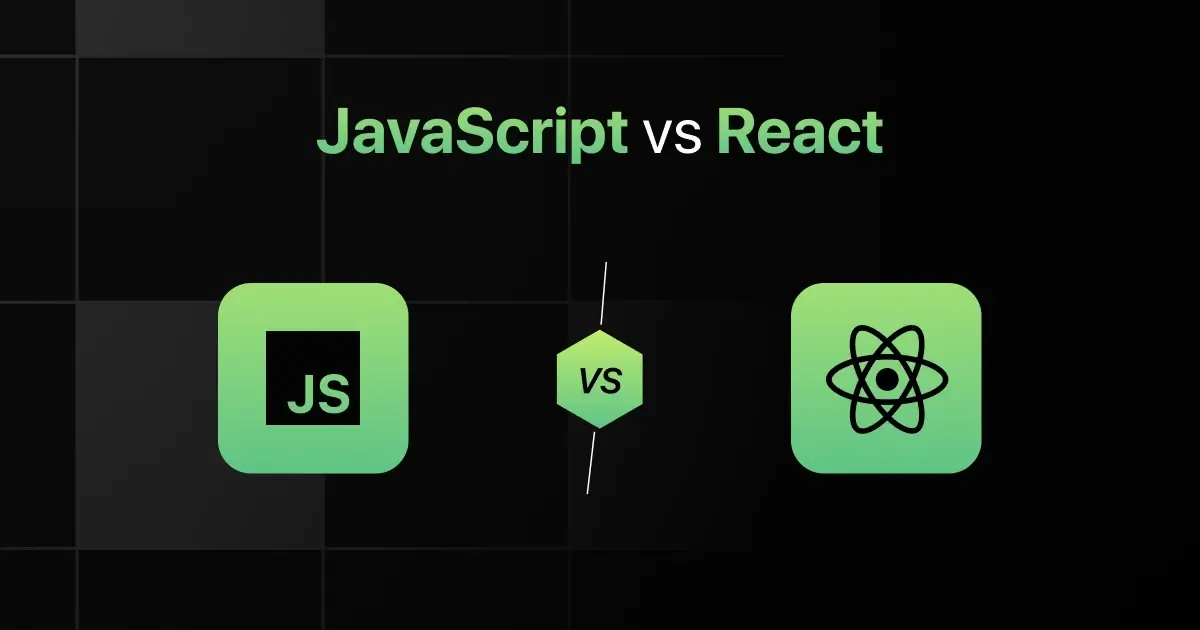When comparing JavaScript and ReactJS, it’s important to look at what sets them apart. The discussion about JavaScript vs ReactJS is common among programmers deciding which technology to use for their projects.
The question of JavaScript vs ReactJS which is better? or JavaScript vs ReactJS which is best? depends on what you need for your specific project.
In this article, let’s know the differences between JavaScript and ReactJS.
JavaScript vs React: Understanding the Key Differences
When comparing JavaScript and React JS, it’s crucial to understand the key distinctions that define their usage and capabilities.
One of the most important differences is that JavaScript is a dynamically typed language primarily used for client-side scripting in web browsers, whereas ReactJS is a library for building user interfaces, particularly for single-page applications where you need efficient data updates.
The following are other major differences between JavaScript and ReactJS:
| S. No. | Parameters | JavaScript | React JS |
|---|---|---|---|
| 1 | Developed By | Netscape, now maintained by the Mozilla Foundation | |
| 2 | Release Year | 1995 | 2013 |
| 3 | Paradigm | Multi-paradigm: event-driven, functional, imperative | Declarative, specifically for user interfaces |
| 4 | Syntax | Standard ECMAScript syntax | JSX (JavaScript XML) which extends ECMAScript |
| 5 | Performance | High performance in web browsers, dependent on the engine | High performance in handling view updates, especially with virtual DOM |
| 6 | Applications and Use Cases | Web development, servers (with Node.js), games, mobile apps | Building user interfaces, particularly for single-page applications (SPAs) |
| 7 | Learning Curve | Relatively easy to start, the vast ecosystem can complicate mastery | Moderate, requires an understanding of its component lifecycle and state management |
| 8 | Libraries and Frameworks | Numerous libraries and frameworks like Angular, Vue.js | React ecosystem includes tools like Redux, React Router |
| 9 | Platform Independence | Runs in any browser or any platform with a JavaScript engine | Dependent on the DOM (for web) and can be rendered on server side with Node.js |
| 10 | Concurrency and Multithreading | Single-threaded with asynchronous event handling via promises and async/await | Uses a reconciliation algorithm (virtual DOM) that can efficiently update the UI in a synchronous manner |
| 11 | Tooling and IDE Support | Extensive support across all major IDEs and text editors | Good support, especially in IDEs with JSX and modern JavaScript capabilities |
| 12 | Memory Management | Managed by the JavaScript engine in the browser | Efficient handling through virtual DOM which minimizes actual DOM manipulation |
| 13 | Error Handling | Error handling with try-catch and error events in the browser | Propagation of errors through component trees with error boundaries |
| 14 | Security | Dependent on the browser's security model | Same as JavaScript, plus attention to XSS vulnerabilities in the component state |
| 15 | Scalability | Scalable with efficient code and asynchronous patterns | Highly scalable in user interface complexity and maintenance with component-based architecture |
| 16 | Key Features | Dynamic typing, prototype-based object orientation, first-class functions | Component-based architecture, virtual DOM, declarative views |
| 17 | Integration with Other Technologies | Integrates well with HTML/CSS and other client-side technologies | Easily integrates with other libraries and frameworks, and modular architecture enhances maintainability |
| 18 | Community and Support | Very large and well-established community | A strong, rapidly growing community with lots of learning resources and commercial support |
| 19 | Job Opportunities | Extensive opportunities in web development, front-end, back-end (Node.js), mobile (React Native) | High demand in web and mobile app development, especially for single-page applications |
| 20 | Future Prospects | Continues to evolve with web standards | Continues to grow in usage, particularly in complex and interactive web applications |
JavaScript vs ReactJS: Which One to Choose?
Choosing between JavaScript and ReactJS can be challenging, but by understanding their distinct advantages, you can make an informed decision.
Choose JavaScript If:
- You aim for roles such as web developer, UI/UX developer, or mobile app developer, especially in startups, digital media agencies, and tech companies focusing on rapid deployment and prototyping.
- You appreciate a language with a massive ecosystem of libraries and frameworks like React, Node.js, and Express, which facilitate quick development across a range of applications from servers to client-side interfaces.
- You prioritize a language renowned for its fast execution speeds necessary for real-time web applications and dynamic website content, optimizing both time-to-interactive and overall user experience.
- You require a universally supported language that operates natively on all modern browsers and platforms, making it the standard choice for client-side scripting.
- You work on dynamic web projects, interactive websites, and real-time applications that benefit from JavaScript’s event-driven non-blocking architecture, making it ideal for tasks requiring high user interaction and data updates.
Choose React JS If:
- You are focused on job roles such as front-end developer, UI/UX designer, or web developer primarily in startups and tech companies that value modern web frameworks.
- You value a library that offers a rich ecosystem of extensions like Redux for state management and React Router for navigation in your web applications.
- You look for efficiency in updating and rendering web pages dynamically, particularly in single-page applications where speed and responsiveness are crucial.
- You aim to build rich user interfaces and applications that need to perform reliably across various platforms including web and mobile apps using React Native.
- You specialize in developing user interfaces with complex state management and dynamic content, making ReactJS ideal for progressive web applications and mobile apps.
Final Words
The main difference between JavaScript and ReactJS lies in their design and use.
The purpose of understanding JavaScript and ReactJS differences is to choose the right tool for the job, depending on factors like the project’s size and how easy it is to maintain.
Frequently Asked Questions
1. What are the key differences between JavaScript and React?
The key differences between JavaScript and React are:
- JavaScript is a programming language, while React is a JavaScript library developed by Facebook.
- JavaScript can be used for a wide range of programming tasks beyond web development, while React specifically addresses building user interfaces.
- React relies on a virtual DOM to improve efficiency, unlike traditional JavaScript which interacts directly with the DOM.
- React implements a component-based architecture, which is a specific design pattern not inherent in JavaScript itself.
2. Which is better JavaScript or React? Which one to choose?
It depends on the project requirements: use JavaScript for general programming and diverse applications; choose React for developing complex and interactive user interfaces.











